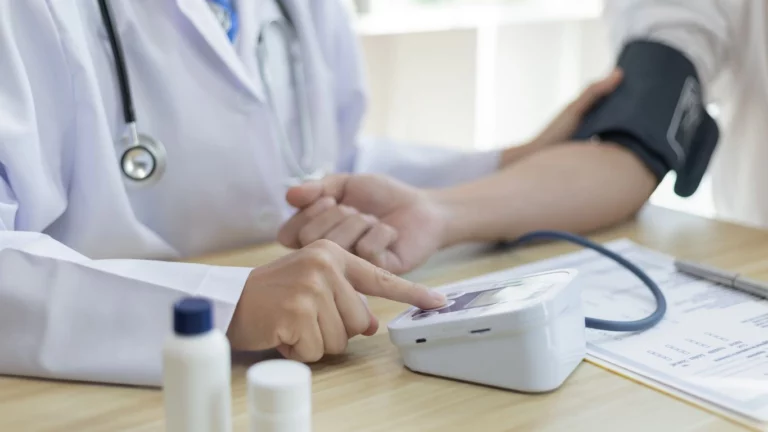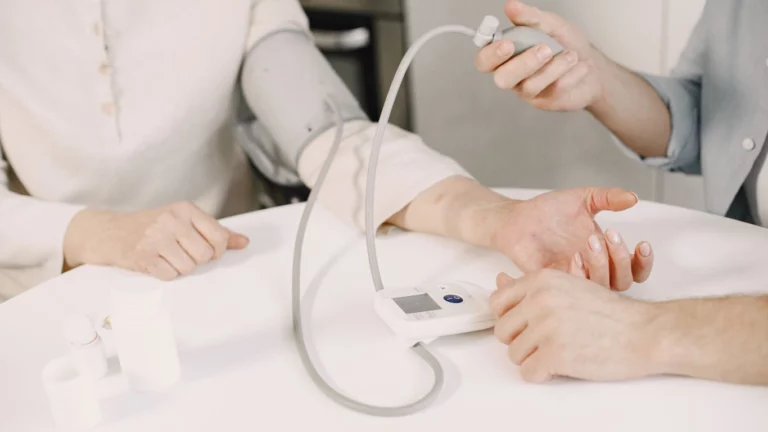Mastering High Blood Pressure: Causes, Symptoms & Management
How do you feel when you have high blood pressure? Explore the intricate world of high blood pressure: its causes, symptoms, effects, and effective management strategies for a healthier, heart-conscious life.
High blood pressure, medically known as hypertension, remains a pervasive and multifaceted health concern affecting individuals worldwide. Often dubbed the “silent killer,” this condition stealthily damages arteries and raises the risk of heart disease, stroke, and other severe complications. In this extensive article, we embark on a comprehensive journey through the intricate landscape of high blood pressure. Our exploration covers its nuanced definition, diverse causes, subtle symptoms, potential ramifications, and a comprehensive guide on effective management strategies for a vibrant and healthier life.
Introduction
High blood pressure’s subtlety lies in its lack of overt symptoms, making it essential to delve deep into its implications. Characterized by elevated force against artery walls as the heart pumps blood, high blood pressure is a formidable precursor to cardiovascular issues that demand keen awareness and understanding. By unraveling its complexities, we can better equip ourselves to recognize its presence and champion preventive measures.
Understanding High Blood Pressure
Definition and Causes
High blood pressure, measured consistently at or above 130/80 mm Hg, arises from a complex interplay of genetic predisposition, lifestyle factors, and underlying medical conditions. Its origins trace back to intricate physiological mechanisms involving hormones, blood vessels, and the heart. Excessive sodium intake, hormonal imbalances, and conditions like kidney disease can contribute to its development. Delving into these intricacies allows us to appreciate the multifaceted nature of this condition.
Risk Factors for High Blood Pressure
Age and genetics significantly influence high blood pressure risk. As we age, blood vessels may lose elasticity, contributing to higher pressure. A familial history of hypertension heightens susceptibility, underlining the role of genetics. Lifestyle choices play a pivotal role, with diets high in processed foods and low in nutrients, sedentary habits, excessive alcohol consumption, and smoking contributing to increased risk. A comprehensive understanding of these risk factors is essential for effective prevention.

Symptoms of High Blood Pressure
Common Physical Signs
While the “silent” aspect of high blood pressure prevails, there are occasional physical indicators. Recurring headaches, particularly in the rear of the head, can provide a subtle clue. Nosebleeds, although infrequent, may also serve as potential red flags. However, these signals are not exclusive to high blood pressure and require careful consideration in a broader health context.
Subtle Indicators to Watch For
Beyond the more recognizable symptoms, subtle indicators can be crucial in identifying high blood pressure. Prolonged fatigue, persistent difficulty sleeping, unexplained chest discomfort, and changes in vision warrant attention. These nuanced signs can prompt timely medical evaluation, serving as catalysts for early detection and intervention.
Effects of High Blood Pressure
Impact on Health and Well-being
The far-reaching consequences of untreated high blood pressure underscore the urgency of managing this condition. The heart, a central player in the circulatory system, bears the brunt of elevated pressure. Over time, this strain can lead to an enlarged heart or heart failure. Blood vessels endure damage, increasing the likelihood of atherosclerosis, a process where fatty deposits accumulate on artery walls. These deposits can obstruct blood flow, precipitating heart attacks or strokes. High blood pressure’s effects extend beyond the cardiovascular system, potentially impacting cognitive function, kidney health, and even vision.
Potential Complications
Complications stemming from high blood pressure are diverse and potentially severe. Aneurysms, characterized by weakened blood vessel walls, can rupture, leading to life-threatening bleeding. Hypertensive crisis, marked by a sudden and severe spike in blood pressure, necessitates immediate medical intervention to prevent organ damage. Pregnancy-related high blood pressure, known as preeclampsia, poses risks for both the mother and the developing baby. Understanding these potential complications underscores the significance of effective management.

Recognizing High Blood Pressure
Regular Blood Pressure Monitoring
Frequent blood pressure monitoring stands as a cornerstone in managing high blood pressure. Especially crucial for those at risk or with a family history, home blood pressure monitors offer convenience for consistent tracking. Maintaining a detailed log of readings empowers individuals and healthcare providers to discern patterns and address concerns proactively.
Visiting a Healthcare Professional
Suspecting high blood pressure or experiencing related symptoms warrants timely consultation with a healthcare professional. Accurate blood pressure measurements, comprehensive health assessments, and personalized guidance form the basis of effective management. Seeking medical expertise is paramount, enabling informed decisions and tailored approaches to care.
Managing High Blood Pressure
Lifestyle Changes
The empowerment to manage high blood pressure begins with proactive lifestyle modifications. Embracing a heart-healthy diet, such as the Dietary Approaches to Stop Hypertension (DASH) diet, rich in fruits, vegetables, whole grains, lean proteins, and low-fat dairy, significantly contributes to blood pressure control. Engaging in a multifaceted exercise routine, incorporating aerobic activities and strength training, bolsters cardiovascular health and aids in blood pressure reduction. Stress management practices, from mindfulness meditation to deep breathing exercises, positively influence overall well-being. Abstaining from tobacco and moderating alcohol intake, along with reducing sodium consumption, synergistically contribute to high blood pressure management.
Medical Interventions
For individuals requiring additional support, medical interventions play an instrumental role. Healthcare providers may prescribe a spectrum of medications tailored to individual needs. Diuretics, beta-blockers, ACE inhibitors, angiotensin II receptor blockers, and calcium channel blockers are among the options. Adherence to prescribed medications, regular follow-up appointments, and open communication with healthcare providers form a collaborative approach to effective management.

Conclusion
High blood pressure, a condition of remarkable complexity, demands our unwavering attention. Its elusive nature does not diminish its significance; rather, it underscores the imperative to delve into its depths. Through unwrapping the intricate web of definitions, causes, symptoms, effects, and management strategies, we empower ourselves to navigate the path toward a heart-healthy life. Vigilant monitoring, informed decision-making, and dedicated lifestyle adjustments amalgamate to create a resilient shield against the potentially devastating consequences of high blood pressure. As we conclude this comprehensive exploration, let us embark on a journey of knowledge, action, and well-being, embracing the power to shape a future marked by cardiovascular health and vitality.
Appendices
References
- Williams B, Mancia G, Spiering W, et al. 2018 ESC/ESH Guidelines for the management of arterial hypertension: The Task Force for the management of arterial hypertension of the European Society of Cardiology and the European Society of Hypertension. European Heart Journal. 2018;39(33):3021-3104. https://academic.oup.com/eurheartj/article/39/33/3021/5079119
- Whelton PK, Carey RM, Aronow WS, et al. 2017 ACC/AHA/AAPA/ABC/ACPM/AGS/APhA/ASH/ASPC/NMA/PCNA Guideline for the Prevention, Detection, Evaluation, and Management of High Blood Pressure in Adults: A Report of the American College of Cardiology/American Heart Association Task Force on Clinical Practice Guidelines. Hypertension. 2018;71(6):e13-e115. https://www.ahajournals.org/doi/full/10.1161/HYP.0000000000000065
- Muntner P, Carey RM, Gidding S, et al. Potential US Population Impact of the 2017 ACC/AHA High Blood Pressure Guideline. Journal of the American College of Cardiology. 2018;71(2):109-118. https://www.ncbi.nlm.nih.gov/pmc/articles/PMC6346270/
FAQs
Can high blood pressure cause headaches?
Occasionally, high blood pressure may lead to headaches, particularly in the back of the head and neck. However, headaches can result from various factors and do not solely indicate high blood pressure.
Are nosebleeds a common symptom of high blood pressure?
While rare, nosebleeds can sometimes occur with high blood pressure. However, they are not a reliable indicator and could be due to other factors.
Can lifestyle changes effectively manage high blood pressure?
Yes, adopting a heart-healthy diet, engaging in regular exercise, managing stress, and reducing alcohol and sodium intake can significantly contribute to managing high blood pressure.
What are the potential complications of untreated high blood pressure?
Untreated high blood pressure can lead to heart disease, stroke, kidney damage, vision problems, aneurysms, and other serious health issues.
Disclaimer
The information provided in this article is for educational and informational purposes only. It should not be considered a substitute for professional medical advice, diagnosis, or treatment. Always seek the advice of a qualified healthcare provider with any questions you may have regarding a medical condition. Never disregard professional medical advice or delay in seeking it based on the information provided herein.

Camellia Wulansari is a dedicated Medical Assistant at a local clinic and a passionate health writer at Healthusias.com. With years of hands-on experience in patient care and a deep interest in preventive medicine, she bridges the gap between clinical knowledge and accessible health information. Camellia specializes in writing about digestive health, chronic conditions like GERD and hypertension, respiratory issues, and autoimmune diseases, aiming to empower readers with practical, easy-to-understand insights. When she’s not assisting patients or writing, you’ll find her enjoying quiet mornings with coffee and a medical journal in hand—or jamming to her favorite metal band, Lamb of God.







